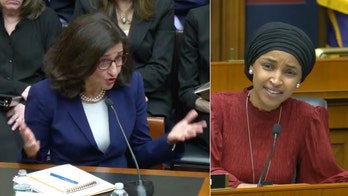The disputed U.S. Senate race in Minnesota and the politically toxic appointment of a replacement to the Illinois seat being vacated by President-elect Barack Obama have left open the possibility that the legislative body could reject two would-be lawmakers.
While the scenario seems far-fetched, Article I, Section 5 of Constitution holds that "Each House shall be the Judge of the Elections, Returns and Qualifications of its own Members."
In other words, if Minnesota certifies either Norm Coleman or Al Franken the winner, a bloc of senators could object on the Senate floor to seating him. The same could happen if embattled Illinois Gov. Rod Blagojevich appoints a "tainted" successor to Obama.
The new Congress starts Jan. 6, and the potential for havoc is immense.
Either scenario could prompt special investigative committees or even floor votes on whether to seat a candidate if their election certification remains controversial.
And if history is a guide, it's possible the outcome may not be known until late next year.
"It's easy to derail something in the Senate," said Senate Historian Don Ritchie. He said if even one senator objects to seating someone in either the Minnesota or Illinois races, the leadership "would desperately try to find out what the dissenters want."
Contesting Senate seats doesn't happen often. The last one was in 1996 when Louisiana Republican Woody Jenkins challenged the election of Democrat Mary Landrieu. Landrieu was seated "without prejudice," a term that Senate experts describe as a fig leaf to cover up that the Senate recognizes voters elected an individual but it is still investigating whether to accept the choice.
The Senate Rules Committee conducted a probe that lasted almost a year. In the end, the Rules Committee didn't even issue a final report on the case.
A review of the election of Sen. Theodore Bilbo, D-Miss., tied the Senate in knots in early 1947. Bilbo was accused of corruption. Sen. Glen Taylor, D-Idaho., demanded the Senate settle the ethics issues before seating Bilbo.
Taylor's actions stymied the Senate. Senators couldn't elect party leaders or even a president pro tempore -- the position third in line to the presidency. In fact, the secretary of Senate presided over the body for weeks.
Fate ultimately settled the impasse when Bilbo conveniently died in the summer of 1947.
Two election certificates for different candidates from New Hampshire spurred a 1974 dispute between Sen. John Durkin, D-N.H., and Sen. Louis Wyman, R-N.H. After seven months of infighting, the Senate ultimately declared the seat vacant and New Hampshire held a new election the next September. Durkin prevailed on that ballot.
During the Durkin-Wyman debate, Sen. James Allen, D-Ala., argued that "this is a matter that should not be decided on the basis of party lines."
Both Democrats and Republicans might look to a 1984 House election as a model of how a disputed election can trigger animosity that resonates for years.
In 1984, House Democrats decided to seat Rep. Frank McCloskey, D-Ind., over Republican challenger Rick McIntyre. The initial tally showed McCloskey defeating McIntyre by 72 votes. But a recount put McIntyre up by 418 votes. After Democrats seated McCloskey, the final straw for House Republicans was when Minority Leader Bob Michel, R-Ill. rising to shake his hand.
The McCloskey episode crystallized decades of pent-up anger on the Republican side. It emerged as a pivotal event and launched the career of a little-known, but feisty congressman from Georgia named Newt Gingrich.
"When (they) stole the seat, we crossed a watershed," Gingrich said later. Gingrich and his acolytes viewed Michel's actions as emblematic of a GOP leader who was too conciliatory toward the Democrats.
"It galvanized the minority and helped the Gingrich forces," Ritchie told FOX News.
Republicans finally exacted revenge on McCloskey by defeating him in the historic 1994 election that anointed Gingrich speaker of the House.
Don Ritchie says the McCloskey-McIntyre fable radicalized Republicans. Democrats may have won that seat. But it set in motion events that eventually cost Democrats the House.
The appointment by Blagojevich carries inherent problems. Federal prosecutors are now probing the Illinois governor for trying to sell Obama's Senate seat. It's unlikely that the Senate would now seat anyone appointed by Blagojevich as lawmakers from both parties could view that appointee as carrying too much of a stigma to be taken seriously.
Conventional wisdom also holds that Democrats would do anything to score a 59th seat, a feat that could be achieved with a Franken win. For the GOP, a Coleman win would be a moral victory in a year where almost everything has gone the Democrats' way.
But conventional wisdom is often wrong. Congressional sources indicate more than a few Senate Democrats are not enthused about having a one-time "Saturday Night Live" star enter the world's most exclusive club.
On top of that, because of his star power, a Franken win in a disputed election would send shock waves across the political landscape. Franken could become a radioactive symbol for Democrats and provide political fodder for Republicans in search of a whipping boy.
"Beware of what you wish for," Ritchie cautioned on overzealousness for either Coleman or Franken "You might just get it."




